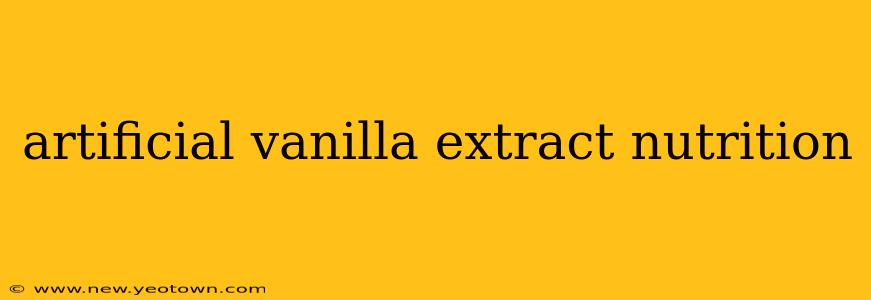Vanilla extract, that beloved essence that transforms simple cakes into decadent delights, comes in two main forms: natural and artificial. While natural vanilla extract boasts a complex flavor profile and a certain je ne sais quoi, artificial vanilla extract offers a more budget-friendly and readily available alternative. But what exactly is in artificial vanilla extract, and what are its nutritional implications? Let's dive into the sweet world of artificial vanilla and uncover its secrets.
What is Artificial Vanilla Extract Made Of?
Unlike its natural counterpart, which is derived from the vanilla bean, artificial vanilla extract doesn't contain any actual vanilla beans. Instead, its primary ingredient is vanillin, a synthetic compound that mimics the flavor and aroma of natural vanilla. This vanillin is often created through chemical processes, sometimes starting from lignin, a component of wood pulp. Other ingredients might include ethanol (alcohol), water, and potentially other flavoring agents to enhance the overall taste. The exact composition can vary slightly between brands, so always check the label for a complete list of ingredients.
Does Artificial Vanilla Extract Have Calories?
This is a question many home bakers and cooks wonder about. The short answer is: yes, but a negligible amount. Artificial vanilla extract contains very few calories per serving – typically less than 5 calories per teaspoon. This minimal caloric contribution makes it a virtually calorie-free ingredient in most recipes.
Is Artificial Vanilla Extract Safe to Consume?
The safety of artificial vanilla extract is a common concern. The FDA (Food and Drug Administration) generally recognizes vanillin as safe for consumption when used as intended in food products. However, it's always wise to practice moderation. While the amount used in typical baking and cooking is unlikely to cause harm, consuming excessive quantities of any food additive might lead to unintended consequences. Always check the product label for any warnings or cautions.
How Does Artificial Vanilla Extract Compare to Natural Vanilla Extract?
The biggest difference lies in the flavor profile. Natural vanilla extract has a richer, more complex flavor with subtle nuances that develop over time. Artificial vanilla extract, while providing a vanilla-like taste, often lacks this depth and can have a somewhat sharper, more artificial note. This difference is often noticeable in discerning palates. The nutritional differences are negligible, with both containing minimal calories. However, the natural variety does offer a slight advantage in terms of potential antioxidants and other beneficial compounds naturally present in the vanilla bean.
What are the potential drawbacks of using artificial vanilla extract?
While considered safe in moderation, some individuals might experience allergic reactions or sensitivities to specific ingredients in artificial vanilla extract, such as the alcohol base (ethanol). Also, the synthetic nature of vanillin might be a concern for some people who prefer natural ingredients. Finally, the flavor profile difference might be a significant drawback for those seeking an authentic vanilla flavor in their culinary creations.
Is artificial vanilla extract vegan?
Generally, yes, artificial vanilla extract is considered vegan. Most commonly used ingredients, including vanillin, ethanol, and water, are all vegan-friendly. However, always check the specific ingredient list of the brand you are using to be absolutely certain, as some brands may contain trace amounts of non-vegan additives.
What are some substitutes for artificial vanilla extract?
If you're looking for alternatives to artificial vanilla extract, you could explore natural vanilla extract, vanilla bean paste (for a more intense vanilla flavor), or even vanilla-flavored powders. Each option offers a slightly different flavor profile and intensity. Experimenting can be a delightful way to discover your preferences.
By understanding the composition, nutritional value, and potential drawbacks of artificial vanilla extract, you can make an informed decision about its use in your kitchen. Remember to always read product labels carefully and choose the ingredient that best suits your needs and preferences.

